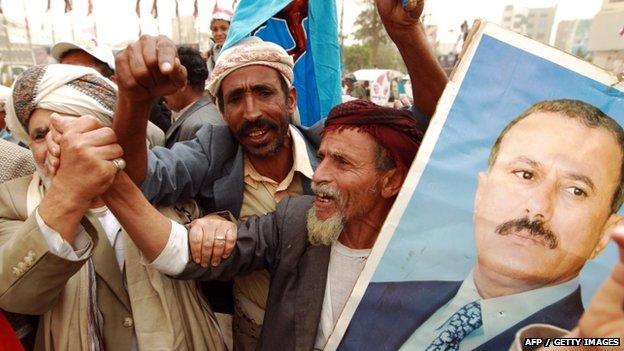Yemen conflict: Houthi rebels condemn UN arms embargo
- Published

Houthis have made a rapid advance across the country
Houthi rebels have condemned Tuesday's UN Security Council arms embargo imposed on them and their allies.
They called for protests against what they termed UN support of "aggression".
The Houthis have made rapid advances across the country, sparking air strikes on their strongholds by a Saudi-led coalition.
The UN says at least 736 people have been killed and 2,700 injured since 26 March, but officials believe the actual death toll may be far higher.
The Houthis' Supreme Revolutionary Committee "called on the masses of the Yemeni people to rally and protest on Thursday to condemn the Security Council resolution in support of the aggression".
Saudi Arabia's UN Ambassador, Abdallah al-Moualimi, said that the resolution was "a very clear endorsement" of the air strikes.
When asked about a possible ground offensive, he warned that the air strikes were a response to Houthi military action and if the Houthis failed to comply with the resolution, "they will continue to face more of the same".
The Egyptian presidency said on Tuesday that Egypt and Saudi Arabia had discussed holding a "major military manoeuvre" in Saudi Arabia with other Gulf states.
Former president targeted
The resolution targets rebel leader Abdul Malik al-Houthi and two other senior rebels, Abd al-Khaliq al-Houthi and Abdullah Yahya al-Hakim.

Former President Saleh and his son Ahmed are named in the embargo
The sanctions also apply to key supporters, including former President Ali Abdullah Saleh and his eldest son Ahmed, a former commander of the elite Republican Guard force.
The embargo also applies to "those acting on their behalf or at their direction in Yemen" - effectively all rebel fighters and Saleh loyalists in the security forces.
The resolution demanded that the Houthis withdraw from areas they have seized, including the capital Sanaa, and resume negotiations on the democratic transition begun in 2011 when Mr Saleh was forced to hand over power to Abdrabbuh Mansour Hadi following mass protests.
It was passed by 14 votes to nil. Russia, which had insisted on imposing an arms embargo on all parties, abstained.
Drone strike
In a separate development, al-Qaeda in Yemen says its top cleric had been killed in a drone strike.
Ibrahim al-Rubaish had a $5m (£3.4m) bounty on his head. There has been no confirmation of his death from Yemeni or US officials.
Al-Rubaish was released from Guantanamo Bay in 2006, after which he joined al-Qaeda in the Arabian Peninsula (AQAP), which is also fighting the Houthis.
Separately on Tuesday, the UN high commissioner for human rights called for an investigation, external into civilian casualties in Yemen.
Zeid Raad al-Hussein said indiscriminate attacks on hospitals and schools could constitute war crimes, and called on all sides to avoid targeting residential areas.